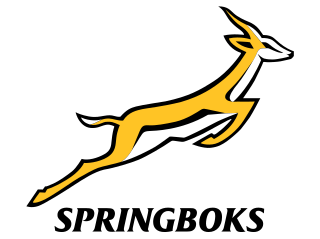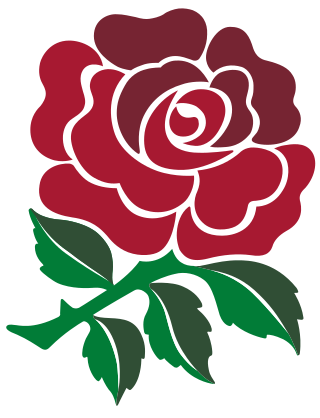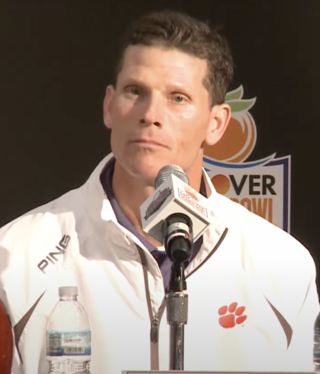
The New Zealand national rugby union team, commonly known as the All Blacks, represents New Zealand in men's international rugby union, which is considered the country's national sport. Famed for their international success, the All Blacks have often been regarded as one of the most successful sports teams in history.

The South Africa national rugby union team, commonly known as the Springboks, is the country's national team governed by the South African Rugby Union. The Springboks play in green and gold jerseys with white shorts, and their emblem is the Springbok, a native antelope and the national animal of South Africa. The team has represented South African Rugby Union in international rugby union since 30 July 1891, when they played their first test match against a British Isles touring team. Currently, the Springboks are the top-ranked rugby team in the world and reigning World Champions, having won the World Cup a record four times. South Africa have won half of the Rugby World Cups they have participated in and are also the second nation to win the World Cup consecutively.

The United States men's national soccer team (USMNT) represents the United States in men's international soccer competitions. The team is governed by the United States Soccer Federation, which is a member of FIFA and CONCACAF.

The England men's national rugby union team represents the Rugby Football Union in men's international rugby union. They compete in the annual Six Nations Championship with France, Ireland, Italy, Scotland and Wales. England have won the championship on 29 occasions, winning the Grand Slam 14 times and the Triple Crown 26 times, making them the most successful outright winners in the tournament's history. They are currently the only team from the Northern Hemisphere to win the Rugby World Cup, having won the tournament in 2003, and have been runners-up on three further occasions.

The Finland national football team represents Finland in men's international football competitions and is controlled by the Football Association of Finland, the governing body for football in Finland, which was founded in 1907. The team has been a member of FIFA since 1908 and a UEFA member since 1957.

The Scotland national rugby union team represents the Scottish Rugby Union in men's international rugby union. The team takes part in the annual Six Nations Championship, where they are the current Calcutta Cup and Doddie Weir Cup holders. They also participate in the Rugby World Cup, which takes place every four years.

The Wales national rugby union team represents the Welsh Rugby Union in men's international rugby union. Its governing body, the Welsh Rugby Union (WRU), was established in 1881, the same year that Wales played their first international against England. The team plays its home matches at the Millennium Stadium in Cardiff, which replaced Cardiff Arms Park as the national stadium of Wales in 1999.
The France national rugby union team represents the French Rugby Federation in men's international rugby union matches. Colloquially known as Le XV de France, the team traditionally wears blue shirts with a Gallic rooster embroidered on the chest, white shorts and red socks in reference to the French national flag. Les Bleus mostly play home matches at the Stade de France in Saint-Denis, near Paris. They compete in the annual Six Nations Championship along with England, Ireland, Italy, Scotland and Wales. France have won the tournament on 26 occasions, winning the Grand Slam 10 times.

The Ukraine national football team represents Ukraine in men's international football, and is governed by the Ukrainian Association of Football, the governing body for football in Ukraine. Ukraine's home ground is the Olimpiyskiy Stadium in Kyiv. The team has been a full member of UEFA and FIFA since 1992.

The South Africa men's national soccer team represents South Africa in men's international soccer and it is run by the South African Football Association, the governing body for Soccer in South Africa. Nicknamed Bafana Bafana, the team's home ground is FNB Stadium, which is located in Johannesburg. The team is a member of both FIFA and Confederation of African Football (CAF). The team are one of the most well-supported national sides in Africa, and are recognized by their traditional yellow-green kits.

The Algeria national football team represents Algeria in men's international football, and is governed by the Algerian Football Federation. The team plays their home matches at the 5 July Stadium in Algiers and Miloud Hadefi Stadium in Oran. Algeria joined FIFA on 1 January 1964, a year and a half after gaining independence. They are the current champions of the FIFA Arab Cup.

The Ivory Coast national football team represents Ivory Coast in men's international football. Nicknamed the Elephants, the team is managed by the Ivorian Football Federation (FIF). The team has won the Africa Cup of Nations three times, in 1992, 2015 and 2024, and has qualified for the FIFA World Cup three times, in 2006, 2010, and 2014.

The Ethiopia national football team, nicknamed Walia, after the Walia ibex, represents Ethiopia in men's international football and is controlled by the Ethiopian Football Federation, the governing body for football in Ethiopia. The team has been representing Ethiopia in regional, continental, and international competitions since its founding in 1943. The Walias play their home games at Addis Ababa Stadium located in the capital city of Addis Ababa. They are currently ranked 150th in the world according to the FIFA World Rankings and 44th in CAF.
The Burkina Faso national football team represents Burkina Faso in men's international football and is controlled by the Burkinabé Football Federation. They were known as the Upper Volta national football team until 1984, when Upper Volta became Burkina Faso. They finished fourth in the 1998 Africa Cup of Nations, when they hosted the tournament. Their best ever finish in the tournament was the 2013 edition, reaching the final.

The Libya national football team represents Libya in men's international association football and it is controlled by the Libyan Football Federation. The team has never qualified for FIFA World Cup but has qualified for editions of the Africa Cup of Nations in 1982, 2006, and 2012. In 1982, the team was both the host and runner-up. In the Arab Cup, Libya finished second in 1964 and 2012, and third in 1966. The team is affiliated with both FIFA and Confederation of African Football (CAF).

The Malawi national football team represents Malawi in association football and is controlled by the Football Association of Malawi. Before 1966, it was known as the Nyasaland national football team.

Otto Martin Pfister is a German football manager and one of Germany's most successful coaching exports, voted Africa's Manager of the Year in 1992. He is formerly the manager of the Afghanistan national team.

The England women's national rugby union team, commonly known as the Red Roses, represents England in women's international rugby union. They compete in the annual Women's Six Nations Championship with France, Ireland, Italy, Scotland and Wales. England have won the championship on a total of 20 out of 29 occasions – winning the Grand Slam 18 times and the Triple Crown 24 times – making them the most successful side in the tournament's history, helped by their status as the only fully professional women's team in 2019. They won the Women's Rugby World Cup in 1994 and 2014, and have been runners-up on six other occasions. Their current permanent head coach, as of October 2023, is John Mitchell.

Thomas Brent Venables is an American college football coach who is the head football coach at the University of Oklahoma, a position he has held since the 2022 season. Venables served as the associate head coach, defensive coordinator, and linebackers coach at Clemson University from 2012 to 2021. He was awarded the Broyles Award in 2016.

Hervé Jean-Marie Roger Renard is a French professional football coach and former player who most recently managed France women's national team.
 New Caledonia
New Caledonia ![]() Didier Chambaron
Didier Chambaron 
















